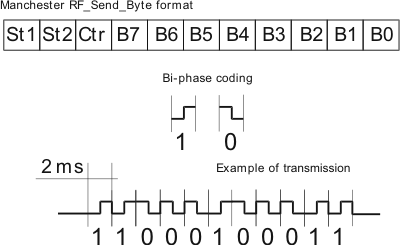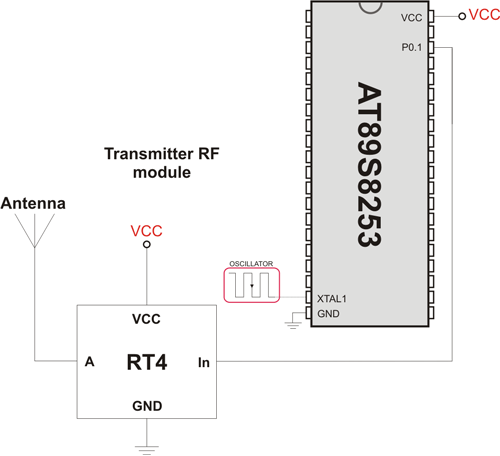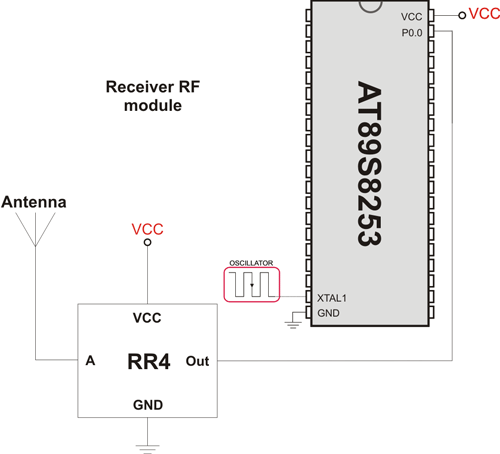Manchester Code Library
The mikroBasic PRO for 8051 provides a library for handling Manchester coded signals. The Manchester code is a code in which data and clock signals are combined to form a single self-synchronizing data stream; each encoded bit contains a transition at the midpoint of a bit period, the direction of transition determines whether the bit is 0 or 1; the second half is the true bit value and the first half is the complement of the true bit value (as shown in the figure below).

Notes:
- The Manchester receive routines are blocking calls (
Man_Receive_InitandMan_Synchro). This means that MCU will wait until the task has been performed (e.g. byte is received, synchronization achieved, etc). - Manchester code library implements time-based activities, so interrupts need to be disabled when using it.
External dependencies of Manchester Code Library
| The following variables must be defined in all projects using Manchester Code Library: | Description: | Example: |
|---|---|---|
dim MANRXPIN as sbit bdata sfr external |
Receive line. | dim MANRXPIN as sbit at P0_0_bit |
dim MANTXPIN as sbit bdata sfr external |
Transmit line. | dim MANTXPIN as sbit at P1_1_bit |
Library Routines
The following routines are for the internal use by compiler only:
- Manchester_0
- Manchester_1
- Manchester_Out
Man_Receive_Init
| Prototype |
sub function Man_Receive_Init()as word |
|---|---|
| Returns |
|
| Description |
The function configures Receiver pin and performs synchronization procedure in order to retrieve baud rate out of the incoming signal. Note: In case of multiple persistent errors on reception, the user should call this routine once again or Man_Synchro routine to enable synchronization. |
| Requires |
|
| Example |
' Initialize Receiver dim MANRXPIN as sbit at P0_0_bit ... Man_Receive_Init() |
Man_Receive
| Prototype |
sub function Man_Receive(dim byref error as byte) as byte |
|---|---|
| Returns |
A byte read from the incoming signal. |
| Description |
The function extracts one byte from incoming signal. Parameters :
|
| Requires |
To use this function, the user must prepare the MCU for receiving. See Man_Receive_Init. |
| Example |
dim data, error as byte ... data = 0 error = 0 data = Man_Receive(&error) if (error <> 0) then ' error handling end if |
Man_Send_Init
| Prototype |
sub procedure Man_Send_Init() |
|---|---|
| Returns |
Nothing. |
| Description |
The function configures Transmitter pin. |
| Requires |
|
| Example |
' Initialize Transmitter: dim MANTXPIN as sbit at P0_1-bit ... Man_Send_Init() |
Man_Send
| Prototype |
sub procedure Man_Send(dim tr_data as byte) |
|---|---|
| Returns |
Nothing. |
| Description |
Sends one byte. Parameters :
Note: Baud rate used is 500 bps. |
| Requires |
To use this function, the user must prepare the MCU for sending. See Man_Send_Init. |
| Example |
dim msg as byte ... Man_Send(msg) |
Man_Synchro
| Prototype |
sub function Man_Synchro() as word |
|---|---|
| Returns |
|
| Description |
Measures half of the manchester bit length with 10us resolution. |
| Requires |
To use this function, you must first prepare the MCU for receiving. See Man_Receive_Init. |
| Example |
dim man__half_bit_len as word ... man__half_bit_len = Man_Synchro() |
Man_Break
| Prototype |
sub procedure Man_Break() |
|---|---|
| Returns |
Nothing. |
| Description |
Man_Receive is blocking routine and it can block the program flow. Call this routine from interrupt to unblock the program execution. This mechanism is similar to WDT. Note: Interrupts should be disabled before using Manchester routines again (see note at the top of this page). |
| Requires |
Nothing. |
| Example |
dim data1, error, counter as byte
sub procedure Timer1InterruptHandler() org IVT_ADDR_ET1
counter = 0
if (counter >= 20) then
begin
Man_Break()
counter = 0 // reset counter
else
Inc(counter) // increment counter
end if
end
main:
TR1_bit = 0 // Stop Timer1
ET1_bit = 1 // Enable Timer1 interrupt
TH1 = 0x00 // Set Timer1 high byte
TL1 = 0x00 // Set Timer1 low byte
TR1_bit = 1 // Run Timer1
EA_bit = 0 // Interrupt disable
...
Man_Receive_Init()
...
// try Man_Receive with blocking prevention mechanism
EA_bit = 1 // Interrupt enable
data1 = Man_Receive(@error)
EA_bit = 0 // Interrupt disable
...
end
|
Library Example
The following code is code for the Manchester receiver, it shows how to use the Manchester Library for receiving data:
program Manchester_Receiver
' LCD module connections
dim LCD_RS as sbit at P2_0_bit
dim LCD_EN as sbit at P2_1_bit
dim LCD_D4 as sbit at P2_2_bit
dim LCD_D5 as sbit at P2_3_bit
dim LCD_D6 as sbit at P2_4_bit
dim LCD_D7 as sbit at P2_5_bit
' End LCD module connections
' Manchester module connections
dim MANRXPIN as sbit at P0_0_bit
dim MANTXPIN as sbit at P0_1_bit
' End Manchester module connections
dim error_flag, counter, ErrorCount, temp as byte
main:
counter = 0
ErrorCount = 0
Lcd_Init() ' Initialize Lcd
Lcd_Cmd(_LCD_CLEAR) ' Clear Lcd display
Man_Receive_Init() ' Initialize Receiver
while TRUE ' Endless loop
Lcd_Cmd(_LCD_FIRST_ROW) ' Move cursor to the 1st row
while TRUE ' Wait for the "start" byte
temp = Man_Receive(error_flag) ' Attempt byte receive
if (temp = 0x0B) then ' "Start" byte, see Transmitter example
break ' We got the starting sequence
end if
if (error_flag <> 0) then ' Exit so we do not loop forever
break
end if
wend
do
temp = Man_Receive(error_flag) ' Attempt byte receive
if (error_flag <> 0) then ' If error occured
Lcd_Chr_CP("?") ' Write question mark on Lcd
Inc(ErrorCount) ' Update error counter
if (ErrorCount > 20) then ' In case of multiple errors
temp = Man_Synchro() ' Try to synchronize again
'Man_Receive_Init() ' Alternative, try to Initialize Receiver again
ErrorCount = 0 ' Reset error counter
end if
else ' No error occured
if (temp <> 0x0E) then ' If "End" byte was received(see Transmitter example)
' do not write anymore received byte on Lcd
Lcd_Chr_CP(temp) ' else write character on Lcd
Inc(counter) ' Counts how many chars have been written on Lcd
if counter = 25 then ' If there were more then 25 characters
' synchronization is off
Lcd_Cmd(_LCD_CLEAR) ' Clear the Lcd of garbled communication
temp = Man_Synchro() ' Try to synchronize again
end if
else
counter = 0 ' reset counter
end if
Delay_ms(25)
end if
loop until ( temp = 0x0E )
wend ' If "End" byte was received exit do loop
end.
The following code is code for the Manchester transmitter, it shows how to use the Manchester Library for transmitting data:
program Manchester_Transmitter
' Manchester module connections
dim MANRXPIN as sbit at P0_0_bit
dim MANTXPIN as sbit at P0_1_bit
' End Manchester module connections
dim index, character as byte
s1 as char[16]
main:
s1 = "mikroElektronika"
Man_Send_Init() ' Initialize transmitter
while TRUE ' Endless loop
Man_Send(0x0B) ' Send "start" byte
Delay_ms(100) ' Wait for a while
character = s1[0] ' Take first char from string
index = 0 ' Initialize index variable
while (character <> 0) ' String ends with zero
Man_Send(character) ' Send character
Delay_ms(90) ' Wait for a while
Inc(index) ' Increment index variable
character = s1[index] ' Take next char from string
wend
Man_Send(0x0E) ' Send "end" byte
Delay_ms(1000)
wend
end.
Connection Example

Simple Transmitter connection

Simple Receiver connection
What do you think about this topic ? Send us feedback!



